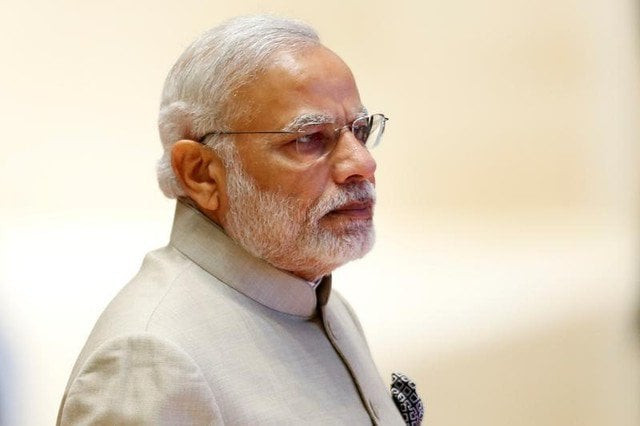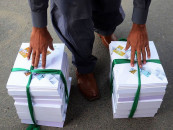After state polls, Modi softens up on talks with Pakistan
New Delhi seems to be revisiting policy on Islamabad

Narendra Modi. PHOTO: REUTERS
Following the recent visit of Indian parliamentarians including members from the ruling Bharatia Janata Party (BJP) and opposition Congress, to attend a meeting of Asian Parliamentary Association, a 10-member Indian delegation is in Pakistan for talks on water issues.
Modi may rethink Pakistan approach
The flurry of visits suggests that India seems to be revisiting its hardline policy on Pakistan after Indian Prime Minister Narendara Modi’s BJP further strengthened its grip on power following the ruling party’s massive win in recent state elections including in UP.
The meeting of Indus waters commissioners scheduled to begin today (Monday) will be the first formal engagement since relationship between the two countries nosedived in September last year after the attack on Indian military base in Uri.
Does this apparent policy shift lead to structured dialogue between the two countries?
Officials in Pakistan are cautious over the development. A senior Foreign Office official while speaking on condition of anonymity told The Express Tribune that Pakistan must not read too much into these recent moves by India.
“India may be willing to send its delegation for Indus waters commissioners meeting, but it remains to be seen if this will lead to further normalisation,” added the official.
Pakistan believes that India is not doing any favour by sending its delegation for the talks on water issues, which many analysts believe, if not handled properly could lead to further escalation in tensions.
India under the 1960 Indus Water Treaty is bound to hold such meetings with Pakistan, another official pointed out.
But the current meeting of Indus Water Commissioners is significant in the sense that Indian Prime Minister Narendara Modi threatened to revoke the water accord with Pakistan.
Analysts believe that Modi might have used the water card for domestic audience and since elections were over in India, therefore he has now decided to reopen the channel of communications with Pakistan.
Modi's party claims victory in India's Uttar Pradesh and three other states
Since September last year, Modi government followed a more aggressive policy towards Pakistan. The main aim of that approach was to isolate Pakistan diplomatically by blaming it for sponsoring terrorism in India.
That approach might have achieved partial success when India persuaded smaller countries in the region to boycott South Asian Association for Regional Cooperation (SAARC) summit scheduled to be held in Islamabad in November last year.
But, overall Modi’s policy on Pakistan finds little traction as regional powers such as Russia and China have refused to toe India’s line.
Recently, top US commander also questioned India’s policy saying Modi government’s efforts to isolate Pakistan diplomatically was troubling.
The statement by CENTCOM chief General Joseph Votel suggested that the Trump administration will likely persuade India to review its tough policy on Pakistan. US is concerned that increased tensions between Pakistan and India could be detrimental for the mission Afghanistan.
Since Pentagon suggested troops surge in Afghanistan, the role of Pakistan has once again become critical for the US to ensure elusive peace in the war-torn country.
These factors could be the reason that India is now willing to revive some contacts with Pakistan, commented Dr Ishtiaq Ahmed, who is closely following such regional developments.
However, Dr Ishtiaq was skeptical if the recent moves could lead to more meaningful engagement between the two countries.
The reason, he pointed out, is the timing. He said Pakistan would be in election mode within few months and in this situation Indian government is unlikely to restore structured dialogue process.
In a recent interview to a private TV channel, Pakistan’s High Commissioner to New Delhi Abdul Basit was also not optimistic about the resumption of structured dialogue between the two countries.
Published in The Express Tribune, March 20th, 2017.



















COMMENTS
Comments are moderated and generally will be posted if they are on-topic and not abusive.
For more information, please see our Comments FAQ